El RGPD, abreviatura de Reglamento General de Protección de Datos, es una ley de la Unión Europea que protege la privacidad de los usuarios cuando utilizan sitios web.
Hemos recibido docenas de correos electrónicos de usuarios que nos piden que expliquemos el RGPD en inglés sencillo y que compartamos consejos sobre cómo hacer que su sitio de WordPress cumpla con el RGPD.
En este artículo, le explicaremos todo lo que necesita saber acerca del RGPD y WordPress (sin los complejos aspectos legales).
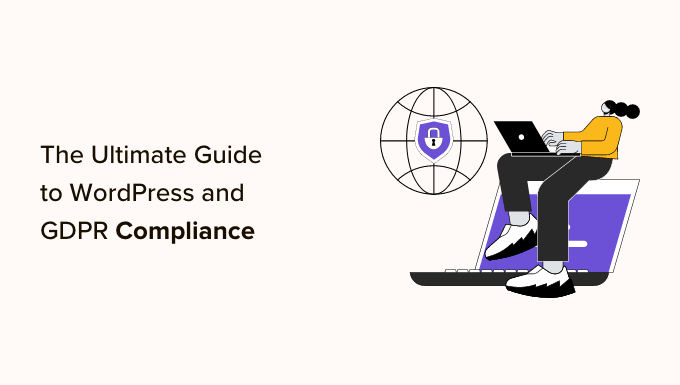
Descargo de responsabilidad
No somos abogados y nada de lo contenido en este sitio web debe considerarse asesoramiento jurídico.
Para ayudarle a navegar fácilmente por nuestra guía definitiva sobre WordPress y el cumplimiento del RGPD, hemos creado un índice a continuación:
- What Is the GDPR?
- Does the GDPR Apply to My WordPress Website?
- What Is Required of Website Owners Under the GDPR?
- Is WordPress GDPR Compliant?
- Additional Areas on Your Website to Check for GDPR Compliance
- Best WordPress Plugins for GDPR Compliance
- Final Thoughts
- Expert Guides on Making Your WordPress Site GDPR-Compliant
- Additional Resources
¿Qué es el RGPD?
El Reglamento General de Protección de Datos (RGPD) es una ley de la Unión Europea (UE) que entró en vigor el 25 de mayo de 2018. El objetivo del RGPD es dar a los ciudadanos de la UE el control sobre sus datos personales y cambiar el enfoque de la privacidad de los datos de las organizaciones de todo el mundo.
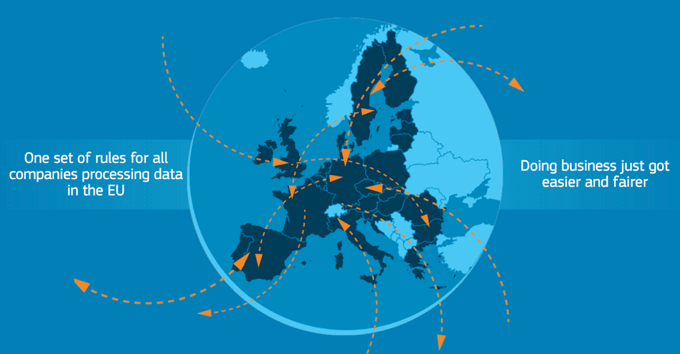
A lo largo de los años, es probable que hayas recibido docenas de correos electrónicos de empresas como Google acerca del RGPD, sus nuevas políticas de privacidad y un montón de otras cuestiones legales. Esto se debe a que la UE ha establecido importantes sanciones para quienes no cumplan la normativa.
Las empresas que no cumplan los requisitos del RGPD pueden enfrentarse a grandes multas de hasta el 4% de los ingresos globales anuales de una empresa o 20 millones de euros (la cantidad que sea mayor). Este es motivo suficiente para que cunda el pánico entre las empresas de todo el mundo.
¿Qué es la CCPA?
El estado de California introdujo una legislación de privacidad similar el 1 de enero de 2020, aunque las multas potenciales son mucho menores.
La Ley de Privacidad del Consumidor de California (CCPA) está concebida para proteger la información personal de los residentes californianos. Les da derecho a saber qué información personal se está recopilando acerca de ellos, a solicitar que se borre y a optar por que no se vendan sus datos.
En este artículo, nos centraremos en el RGPD, pero muchos de los pasos que enumeramos en este artículo también le ayudarán a cumplir con la CCPA.
Esto nos lleva a la gran pregunta que quizá se esté planteando:
¿Se aplica el RGPD a mi sitio web WordPress?
La respuesta es SÍ. Se aplica a todas las empresas, grandes y pequeñas, del mundo (no sólo de la Unión Europea).
Si su sitio web en WordPress tiene visitantes de países de la Unión Europea, esta ley le es aplicable.
Pero que no cunda el pánico. No es el fin del mundo.
Aunque el RGPD puede escalar hasta esos altos niveles de multas, empezará con una advertencia, luego una amonestación y después una suspensión del tratamiento de datos.
Y solo si sigue infringiendo la ley le llegarán las grandes multas.
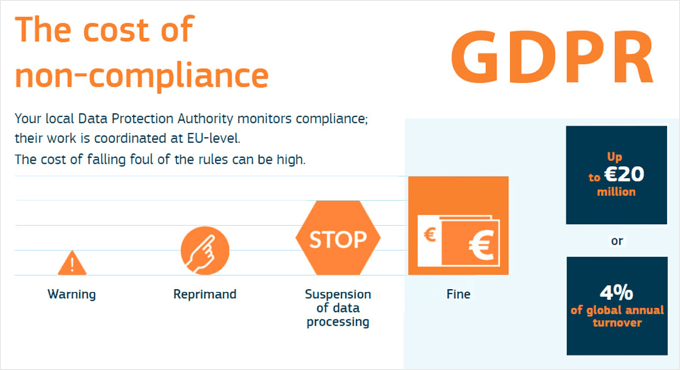
La UE no es un gobierno malvado que va a por usted. Su objetivo es proteger a los consumidores inocentes de un tratamiento imprudente de los datos que pueda vulnerar su intimidad.
En nuestra opinión, la multa máxima pretende en gran medida llamar la atención de grandes empresas como Facebook y Google para que NO ignoren esta normativa. Además, esto anima a las empresas a poner realmente más énfasis en proteger los derechos de las personas.
Una vez que entienda lo que es obligatorio / requerido / necesario por el RGPD y el espíritu de la ley, entonces se dará cuenta de que nada de esto es demasiado loco.
También compartiremos herramientas y consejos para que su sitio de WordPress cumpla con el RGPD.
¿Qué se exige a los propietarios de sitios web en virtud del RGPD?
El objetivo del RGPD es proteger la información de identificación personal (IPI) de los usuarios y exigir a las empresas un mayor nivel de exigencia en lo que respecta a la forma en que recopilan, almacenan y utilizan estos datos.
Estos datos personales incluyen los nombres de sus usuarios, direcciones de correo electrónico, direcciones físicas, direcciones IP, información sanitaria, ingresos, etc.
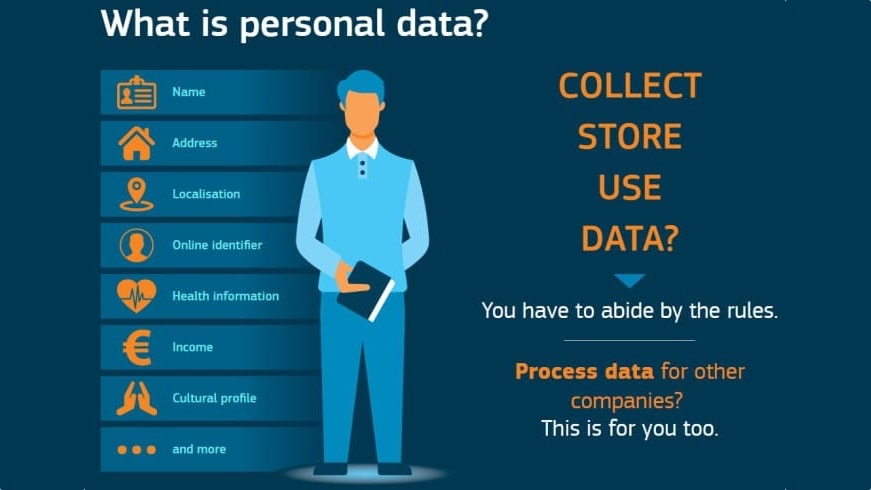
Aunque el reglamento RGPD tiene 200 páginas, estos son los pilares más importantes que debe conocer:
Debe obtener el consentimiento explícito para recopilar información personal
Si recopila datos personales de un residente en la UE, debe obtener un consentimiento o permiso explícito, específico e inequívoco.
En otras palabras, no puede enviar correos electrónicos no solicitados a alguien que le ha dado su tarjeta de visita o ha rellenado el formulario de contacto de su sitio web. Eso es Spam. En su lugar, debe permitirles que se suscriban a su boletín de marketing.
Para que se considere consentimiento explícito, debe requerir un “opt-in” positivo. La casilla de verificación no debe estar marcada por defecto, debe contener una redacción clara (sin jerga legal) y debe estar separada de otros términos y condiciones.
Sus usuarios tienen derecho a sus datos personales
Debe informar a las personas dónde, por qué y cómo se procesan y almacenan sus datos.
Toda persona tiene derecho a descargar sus datos personales y a ser olvidada.
Esto significa que tienen derecho a exigir que borres sus datos personales. Cuando un usuario hace clic en un enlace para darse de baja o te pide que borres su perfil, tienes que hacerlo.
Debe proporcionar indicaciones rápidas sobre la violación de datos
Las organizaciones deben informar de ciertos tipos de violaciones de datos a las autoridades pertinentes en un plazo de 72 horas, a menos que la violación se considere inocua y no suponga ningún riesgo para los datos individuales.
Sin embargo, si la violación es de alto riesgo, la empresa también debe informar inmediatamente a las personas afectadas.
Es de esperar que esto evite encubrimientos como el de Yahoo, que no se reveló hasta la adquisición.
Puede que necesite nombrar a un responsable de la protección de datos
Si es una empresa pública o procesa grandes cantidades de información personal, debe nombrar a un responsable de protección de datos.
No es obligatorio / requerido / necesario para las pequeñas empresas. Consulte a un abogado si tiene dudas.
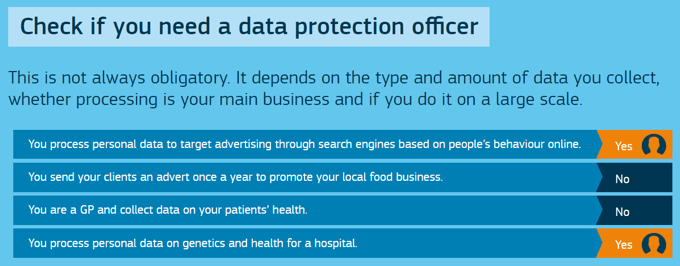
Resumen en inglés sencillo de lo obligatorio / requerido / necesario
En pocas palabras, el RGPD garantiza que las empresas no puedan enviar spam a los usuarios mediante correos electrónicos que no hayan solicitado. Las empresas tampoco pueden vender datos personales sin su consentimiento explícito.
Las empresas deben borrar las cuentas de los usuarios y darlos de baja de las listas de correo electrónico cuando se les solicite. Las empresas también tienen que informar de las violaciones de datos y, en general, mejorar en materia de protección de datos.
Suena bastante bien, al menos en teoría.
Pero probablemente te estés preguntando qué tienes que hacer para asegurarte de que tu sitio de WordPress cumple con el RGPD.
En realidad, eso depende de su sitio web concreto (más adelante hablaremos de ello).
Empecemos respondiendo a la pregunta más importante que nos han hecho los usuarios:
¿Cumple WordPress el RGPD?
Sí, el núcleo de WordPress cumple con el RGPD desde WordPress 4.9.6, que se publicó el 17 de mayo de 2018. Se han añadido varias mejoras del RGPD para lograrlo.
Es importante tener en cuenta que cuando hablamos de WordPress, estamos hablando de WordPress.org autoalojado. Esto es diferente de WordPress.com, y puedes aprender la diferencia en nuestra guía sobre WordPress.com vs. WordPress.org.
Dicho esto, debido a la naturaleza dinámica de los sitios web, ninguna plataforma, plugin o solución puede ofrecer el 100% de cumplimiento del RGPD. El proceso de cumplimiento del RGPD variará en función del tipo de sitio web que tenga, de los datos que almacene y de cómo procese los datos en su sitio.
Bien, puede que se pregunte qué significa esto en lenguaje llano.
Pues bien, por defecto, WordPress viene con las siguientes herramientas de mejora del RGPD:
Comentarios Casilla de verificación de consentimiento
Antes de mayo de 2018, WordPress almacenaba por defecto el nombre, correo electrónico y sitio web del comentarista como cookie en el navegador / explorador del usuario. Esto facilitaba a los usuarios dejar comentarios en sus blogs favoritos porque esos campos estaban rellenados previamente.
Debido al requisito de consentimiento del RGPD, WordPress ha añadido una casilla de verificación de consentimiento al formulario de comentarios.

El usuario puede dejar un comentario sin marcar / comprobar esta casilla. Sin embargo, tendrá que introducir manualmente su nombre, correo electrónico y sitio web cada vez que lo haga.
Consejo: Asegúrese de que está desconectado cuando haga la prueba para ver si la casilla de verificación está ahí.
Si la casilla de verificación sigue sin aparecer, es probable que tu tema esté sobrescribiendo el formulario de comentarios de WordPress por defecto. Aquí tienes una guía práctica sobre cómo añadir una casilla de verificación de privacidad de comentarios RGPD en tu tema de WordPress.
Características de exportación y borrado de datos personales
WordPress ofrece a los propietarios de sitios las herramientas que necesitan para cumplir con los requisitos de tratamiento de datos del RGPD y satisfacer las solicitudes de los usuarios para exportar datos personales, así como para quitar / eliminar los datos personales de los usuarios.
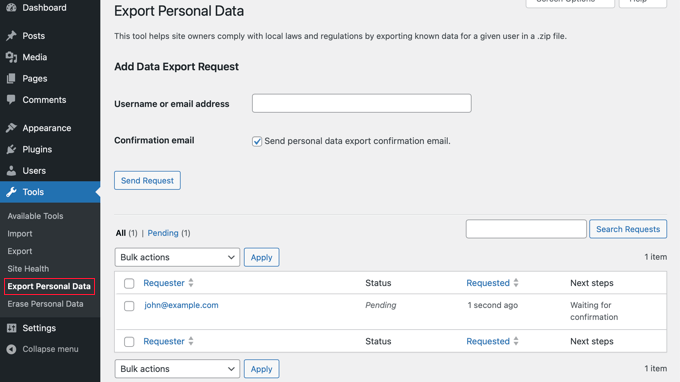
Las características de manejo de datos se pueden encontrar en el menú Herramientas dentro del administrador de WordPress. Desde aquí, puede ir a Exportar datos personales o Borrar datos personales.
Política de privacidad
WordPress incorpora un generador de políticas de privacidad. Tiene una plantilla de política de privacidad ya hecha y le ofrece orientación sobre qué más añadir. Esto le ayuda a ser más transparente con los usuarios en términos de qué datos almacena y cómo maneja sus datos.
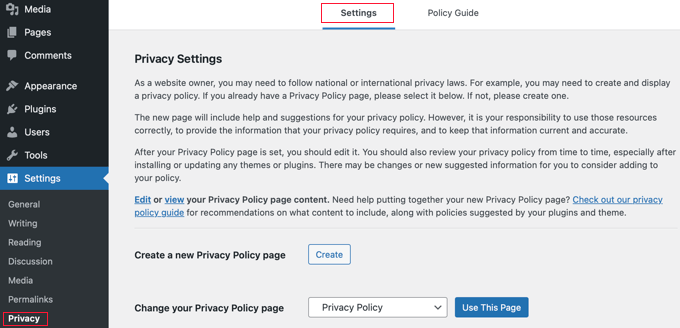
Puede obtener más información en nuestra guía sobre cómo crear una política de privacidad en WordPress.
Estas tres características son suficientes para que un blog de WordPress por defecto cumpla con el RGPD. Sin embargo, es probable que su sitio web tenga otras áreas que también deban cumplir la normativa.
Áreas adicionales de su sitio web para marcar / comprobar el cumplimiento del RGPD
Como propietario de un sitio web, es posible que utilice varios plugins de WordPress que almacenan o procesan datos, y estos pueden afectar a su cumplimiento del RGPD. Algunos ejemplos comunes son:
- Formularios de contacto
- Analítica
- Marketing por correo electrónico
- Tiendas en línea
- Sitios de membresía
- Y más
Dependiendo de los plugins de WordPress que esté utilizando en su sitio web, tendrá que actuar en consecuencia para asegurarse de que su sitio web cumple con el RGPD.
Muchos de los mejores plugins de WordPress han añadido características de mejora del RGPD. Echemos un vistazo a algunas de las áreas comunes que tendrá que dirigir.
Google Analytics
Como la mayoría de los propietarios de sitios web, es probable que utilice Google Analytics para obtener estadísticas del sitio web. Esto significa que puede estar recopilando o realizando un seguimiento de datos personales como direcciones IP, ID de usuario, cookies y otros datos para crear perfiles de comportamiento.
Para cumplir con el RGPD, debe realizar una de las siguientes acciones:
- Anonimizar los datos antes de que empiecen a almacenarse y procesarse.
- Añadir una sobreimpresión que avise de la existencia de cookies y pida el consentimiento de los usuarios antes del seguimiento.
Ambas cosas son bastante difíciles de hacer si se limita a pegar el código de Google Analytics manualmente en su sitio. Sin embargo, si utiliza MonsterInsights, el plugin de Google Analytics más popular para WordPress, está de suerte.
Han lanzado una extensión para el cumplimiento de la UE que ayuda a automatizar el proceso anterior.

MonsterInsights también tiene una muy buena entrada de blog hablando acerca de la RGPD y Google Analytics. Esta es una lectura obligada si está utilizando Google Analytics en su sitio.
Formularios de contacto
Si utiliza un formulario de contacto en WordPress, puede que necesite añadir medidas de transparencia adicionales. Esto es especialmente cierto si almacena las entradas / registros del formulario o utiliza los datos con fines de marketing.
Estos son algunos aspectos que debe tener en cuenta para que sus formularios de WordPress cumplan con la RGPD:
- Obtener el consentimiento explícito de los usuarios para almacenar su información.
- Obtenga el consentimiento explícito de los usuarios si tiene previsto utilizar sus datos con fines de marketing, como añadirlos a su lista de correo electrónico.
- Desactive las cookies, el agente de usuario y el seguimiento de IP para los formularios.
- Cumplir con las solicitudes de borrado de datos.
- Si utiliza una solución de formularios SaaS, asegúrese de tener un acuerdo de procesamiento de datos con sus proveedores de formularios.
La buena noticia es que no necesita organizar un acuerdo de procesamiento de datos si utiliza un plugin de WordPress como WPForms, Gravity Forms o Ninja Forms.
Estos plugins almacenan las entradas / registros de los formularios en la base de datos de WordPress, por lo que, para cumplir con el RGPD, solo tienes que añadir una casilla de verificación de consentimiento con una explicación vaciada.
WPForms, el plugin de formulario de contacto que utilizamos en WPBeginner, tiene varias mejoras de RGPD para facilitarle la tarea de añadir un campo de consentimiento de RGPD, desactivar las cookies de usuario, desactivar la recopilación de IP de usuario y desactivar entradas con un solo clic.
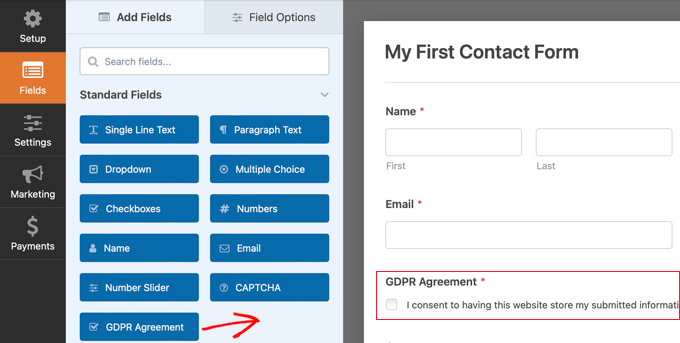
Puedes consultar nuestra guía paso a paso sobre cómo crear formularios que cumplan con el RGPD en WordPress.
Formularios de suscripción de correo electrónico
Al igual que ocurre con los formularios de contacto, si dispone de formularios de suscripción de marketing por correo electrónico, como anuncios emergentes, barras flotantes, formularios integrados, etc., debe asegurarse de obtener el consentimiento explícito de los usuarios antes de añadirlos a su lista.
Esto puede hacerse
- Añadir una casilla de verificación que el usuario tiene que hacer clic antes de opt-in.
- Sólo tiene que requerir doble-optin a su lista de correo electrónico.
Las mejores soluciones de generación de clientes potenciales, como OptinMonster, han añadido casillas de verificación de consentimiento RGPD y otras características necesarias para ayudarle a que sus formularios de suscripción por correo electrónico cumplan con la normativa.
Puede leer más acerca de las estrategias del RGPD para profesionales del marketing en el blog de OptinMonster.
Tiendas de comercio electrónico y WooCommerce
Si utilizas WooCommerce, el plugin de comercio electrónico más popular para WordPress, debes asegurarte de que tu sitio web cumple con el RGPD.
Por suerte, el equipo de MonsterInsights ha preparado una guía en profundidad sobre cómo hacer que una tienda WooCommerce cumpla con el RGPD.
Anuncios de reorientación
Si su sitio web utiliza píxeles de retargeting o anuncios de retargeting, deberá obtener el consentimiento del usuario.
Puede hacerlo utilizando un plugin como WPConsent. Bloquea todos los scripts de seguimiento hasta que los usuarios dan su permiso, a diferencia de los avisos básicos de cookies que sólo muestran una advertencia.
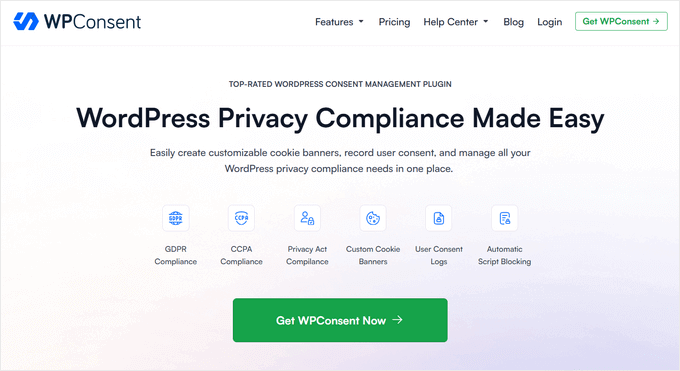
El plugin gestiona servicios populares como Google Analytics y el píxel de Facebook a la vez que mantiene registros de consentimiento detallados, para que pueda llevar a cabo sus campañas de marketing sabiendo que cumple totalmente con la normativa.
Puede encontrar instrucciones detalladas en nuestra guía sobre cómo añadir una ventana emergente de cookies en WordPress para RGPD/CCPA.
Fuentes Google
Google Fonts son una excelente forma de personalizar la tipografía de tu sitio web en WordPress.
Sin embargo, se ha descubierto que Google Fonts infringe la normativa RGPD. Esto se debe a que Google registra la dirección IP de su visitante cada vez que se carga una fuente.
Por suerte, hay algunas maneras de manejar esto para que su sitio web cumpla con el RGPD. Por ejemplo, puede cargar las fuentes localmente, sustituir Google Fonts por otra opción o desactivarlas.
Puedes aprender a hacerlo en nuestra guía sobre cómo hacer que Google Fonts sea respetuoso con la privacidad.
Los mejores plugins de WordPress para el cumplimiento del RGPD
Hay varios plugins de WordPress que pueden ayudarle a automatizar algunas partes del cumplimiento del RGPD.
Sin embargo, ningún plugin puede ofrecer una conformidad del 100% debido a la naturaleza dinámica de los sitios web.
Tenga cuidado con cualquier plugin de WordPress que afirme ofrecer un cumplimiento del 100% del RGPD. Es probable que no sepan de lo que están hablando, y es mejor que los evites por completo.
A continuación se muestra nuestra lista de plugins recomendados para el cumplimiento del RGPD:
- WPConsent bloquea automáticamente todas las secuencias de comandos de seguimiento hasta que los visitantes dan su permiso, mantiene registros detallados del consentimiento del usuario e incluye banners de privacidad fáciles de personalizar para que su sitio cumpla las normas. También existe una versión gratuita de WPConsent.
- Si utiliza Google Analytics, le recomendamos que utilice MonsterInsights y active su extensión de cumplimiento de la UE.
- WPForms es el plugin para formularios de contacto de WordPress más fácil de usar y ofrece campos RGPD y otras características.
- Cookie Notice es un popular plugin gratuito para añadir un aviso de cookies de la UE, y se integra bien con los mejores plugins como MonsterInsights y otros.
- RGPD Cookie Consent te permite crear una barra de alerta en tu sitio para que el usuario pueda decidir si acepta o rechaza las cookies y cubre tanto CCPA como RGPD.
- WP Frontend Borrar cuenta es un plugin gratuito que permite a los usuarios borrar automáticamente su perfil en su sitio.
- OptinMonster es un software avanzado de generación de clientes potenciales que ofrece características inteligentes de segmentación para aumentar las conversiones, al tiempo que cumple con la normativa RGPD.
- PushEngage le permite enviar mensajes push dirigidos a los visitantes después de que abandonen su sitio y es totalmente compatible con el RGPD.
- Smash Balloon le ofrece una forma conforme a la RGPD de incrustar feeds en directo y mostrar entradas de Facebook, Twitter, Instagram, YouTube, TripAdvisor y mucho más.
- Novashare permite a los usuarios compartir tus contenidos en las redes sociales sin recoger sus datos personales ni colocar cookies.
Encontrará más opciones en nuestra selección experta de los mejores plugins de WordPress para el RGPD para mejorar el cumplimiento.
Seguiremos supervisando el ecosistema de plugins para ver si algún otro plugin de WordPress destaca y ofrece características sustanciales de cumplimiento del RGPD.
Reflexiones finales
El RGPD está en vigor desde mayo de 2018.
Tal vez usted ha tenido su sitio web de WordPress por un tiempo y ha estado trabajando hacia el cumplimiento del RGPD. O puede que esté empezando con un nuevo sitio web.
En cualquier caso, no hay que alarmarse. Sigue trabajando para cumplir la normativa y hazlo cuanto antes.
Puede que le preocupen las grandes multas. Recuerde que el riesgo de ser multado es mínimo. El sitio web de la Unión Europea indica que primero recibirá una advertencia, luego una amonestación y las multas son el último paso si incumple e ignora la ley a sabiendas.
Recuerde que la UE no va a por usted. Lo hace para proteger los datos de los usuarios y restablecer la confianza de la gente en las empresas en línea.
A medida que el mundo se digitaliza, necesitamos estas normas. Con las recientes violaciones de datos de grandes empresas, es importante que estas normas se adapten a nivel mundial.
Será bueno para todos. Estas nuevas normas ayudarán a aumentar la confianza de los consumidores y, a su vez, contribuirán al crecimiento de su negocio.
Esperamos que este tutorial te haya ayudado a aprender a cumplir con el RGPD en tu blog de WordPress. Puede que también te interese consultar nuestras guías de expertos sobre cómo hacer que tu sitio web cumpla con el RGPD.
Guías de expertos para que su sitio WordPress cumpla el RGPD
- Cómo añadir una casilla de verificación de privacidad de comentarios RGPD en WordPress
- Cómo añadir una ventana emergente de cookies en WordPress para RGPD/CCPA
- Cómo saber si su sitio web WordPress utiliza cookies
- Cómo crear formularios compatibles con el RGPD en WordPress
- Cómo hacer que las fuentes de Google sean respetuosas con la privacidad
- Cómo desactivar Google Fonts en su sitio web WordPress
- Cómo añadir una política de privacidad en WordPress
If you liked this article, then please subscribe to our YouTube Channel for WordPress video tutorials. You can also find us on Twitter and Facebook.
Aviso legal
No somos abogados y nada de lo que aparece en este sitio web debe considerarse asesoramiento jurídico. Debido a la naturaleza dinámica de los sitios web, ningún plugin o plataforma puede ofrecer un cumplimiento legal al 100%.
En caso de duda, lo mejor es consultar a un abogado especializado en Derecho de Internet para determinar si cumple todas las leyes aplicables en su jurisdicción y en sus casos de uso.
Recursos adicionales
- Histeria del RGPD Parte I y Parte II por Jacques Mattheij
- Infografía sobre protección de datos de la Comisión Europea
- Principios del RGPD por la Comisión Europea
- RGPD y MonsterInsights: todo lo que necesita saber acerca del cumplimiento del RGPD por parte de Google Analytics
- Características de mejora del RGPD para WPForms: todo lo que necesita saber acerca del cumplimiento del RGPD para sus formularios de WordPress.
- WooCommerce y el RGPD: todo lo que necesitas saber acerca del cumplimiento del RGPD para tu tienda online
- OptinMonster y el RGPD: todo lo que necesita saber acerca de la conformidad con el RGPD y los formularios de suscripción de correo electrónico.
If you liked this article, then please subscribe to our YouTube Channel for WordPress video tutorials. You can also find us on Twitter and Facebook.




Teresa Cuervo
I use Jetpack plugin for my contact form and stats (among others) How to make their contact form compliant?
Thanks
Dan
One thing that people don’t seem to be discussing is the comment section. Right here, in this very form, you just asked me for my email address, as does every standard WP comment form. But nowhere are you telling me what this email address will be used for. You aren’t using it for follow up because I’m not going to subscribe to that option.
The default WP comment behaviour is just to ask for people’s email address but with no particular purpose, which also goes against GDPR, right? You have to have a purpose to ask for someone’s data now.
This seems so obvious that I wonder what I’m missing. They clearly thought about comments and added that new cookie comment check-box, so why is nothing mentioned about the email address collection in the first place?
Faizan
Thelanguage you use o explain this GDPR issue,is tremendously unique. ALL in one solution for small projects like mine. From this I get to know completely about GDPR and Now I can analyze where i have to improve.
Thanks
Rahadian
Wonderful guide, I thought this compliance is not affecting me, although I wonder what is this “GDPR compliance” people talking about, and this article provide me with clear explanation. Now I know I should update my website and must follow this compliance. Thank you for sharing this information.
Q
Thank you for a very detailed explanation AND most of all for curbing panic. I can look at decent solutions and implement GDPR compliance on my website with ease now that I know what it entails.
Himadri Saha
Hi, Thanks for your nice, clear and explanatory article. I am using Sumome to generate my subscriber base. Do you have any idea whether this is GDPR compliant?
Editorial Staff
Hi Himdari,
You’d have to ask the Sumo team as to what they’re doing about GDPR
Admin
Aliyy Oke
What a succinct and we’ll informative article. This article has quite enlightenment effect on understanding what GDPR is. Until now I never knew that this law is just going to be taking its effect from 25th of May and there has been a lot buzzes and news of it here and there for a long time now. Thank you for the wonderful post.
Waqas
I run a cybersecurity news website and I have never collected anything from any visitor other than email for sending readers notifications about new news articles.
Do I have to go through all this headache as well? Also, do we have to show GDPR compliance popup to visitors like we do with cookie consent popup?
Thanks for the great article.
Gary Sonnenberg
I think you’re going to get a lot of hits on this article.
I agree with others that it’s the best one out there so far. Thanks!
Jeff Coombs
Hey!
How would I know – or – what can I do on my WordPress site to make sure there are no cookies being used so I don’t have to have the cookie warning or any other policy (GDPR etc) to worry about?
(I just have a few “how-to” guides on there, nothing else – no comments etc or any contact boxes etc).
* Thank you for taking the time to create this GDPR post – greatly appreciated!
JC.
Cheryl Harrison
Other sources say that GDPR applies only to people/company in the EU, NOT to EU citizens who happen to be in the US.
We have enabled country blocking so our site is simply not available anywhere but the US and Canada.
Is it your (non-legal) opinion that we therefore do not need to comply?
glenda taylor
I have used WP Simple Membership Plug in on my website. What do I need to do to update the forms there?
WPBeginner Support
Hi Glenda,
Individual plugins will address GDPR compliance on their own. Please reach out to plugin’s support and they will point you in the right direction.
Admin
rodrigo
Congratulations for a very informative and well explained article. A very good starting point for further reading.
Tamara
Thank you for this
About the plugins you recommend, so you recommend downloading ALL OF THEM right?
Thank you
Tamara
Editorial Staff
They’re all good plugins. You can use the ones that you need
Admin
Carolyn Astfalk
This is a very helpful article. I’d previously addressed all of these issues in the fashion you recommend, but there is one thing I cannot find an answer to despite searching and posting in multiple places:
What about WP blog subscriptions? Nothing in the WP or JetPack updates that I can find provides that check box of consent for blog subscribers. Don’t those email and WP subscriptions require consent too?
WPBeginner Support
Hi Carolyn,
They have addressed some of these issues, to learn more please contact their support forums and they will point you in the right direction.
Admin
Dan
Understanding Title 9 is key.
Here’s a link,
http://www.privacy-regulation.eu/en/article-9-processing-of-special-categories-of-personal-data-GDPR.htm
Dan
This is a good resources as well,
https://www.compliancejunction.com/gdpr-for-small-business/
Quoting below –
What effect could the GDPR have on small businesses?
For the purposes of the GDPR, a small business is classified as one with fewer than 250 employees. Any business with more than 250 employees is required to comply with the GDPR and is required to nominate a Data Protection Officer (DPO).
Businesses with fewer than 250 employees are required to comply with the GDPR if their data processing could affect the rights and freedoms of individuals, if they process personal data on a regular basis, or if they process data which is covered by Article 9 of the GDPR, which includes sensitive data such as that relating to religious beliefs. If any of these apply to a small business, it needs to ensure that it complies with all aspects of the GDPR.
Dan
You are omitting the part of GDPR that gives exemptions to companies with less than 200 employees. At least I didn’t see any mention of it.
Editorial Staff
I believe that part is specific to requiring a Data Protection Officer. However I do agree that risk of penalty is lower for smaller businesses, but it doesn’t mean that they shouldn’t do their best to comply.
-Syed
Admin
Brian77
WordPress 4.9.6 is not GDPR-compliant, not at all, sorry. Core-content in backend available to all user roles including subscriber is hosted on third party servers without information and/or consent. User IPs are stored in database without notice, just look for session_token. User IPs are stored for comments. User email is used in filename for GDPR data export. Exported meta fields from user profile are hardcoded, export will be incomplete in most cases. And there are a lot of of bugs like privacy policy page can not be edited by editors, your clients need full admin access to edit that page now, good luck with that.
Wayne Rose
What a great article, the first bit of sense i have read about the mysterious GDPR, I found that this was informative to start off with and also helpful with advising on plug-ins to add to my website to help make it compliant.
Thank you very much, i can now breathe a sigh of relief!
Dawson Johnson
Amazing article, thanks so much.
A few questions:
— With regard to MonsterInsights, is the “anonymize IP” feature in the free version sufficient for GDPR compliance with regard to Google Analytics? Or is there critical functionality associated with the paid version (and EU Compliance Addon)?
— I’m a bit concerned about third-party ads (via networks like Taboola, RevContent, etc). What exactly is and isn’t required of publishers given that we in no way control or process the data that they collect / cookies they store?
— With regard to Cookie Plugins, are there any that A) actually block third-party cookies on your site based on a lack of consent or opt-out and B) can be geotargeted to EU users?
I’m a US based publisher, so I don’t want to show opt-out messages (and risk losing track / ad dollars) to visitors who are outside Europe.
WPBeginner Support
Hi Dawson,
Please see MonsterInsights’ blog post for more details.
You will need to reach out to each network, and most likely they will already have documentation on how to prepare for GDPR compliance.
As for cookie plugins, surely there will be more plugins coming out to address different requirements.
Admin
stefan
Hi,
Not identifying people that post on your blog can be dangerous for many sites. If someone threatens to sue you and you have insurance, I think you need to inform about it and be able to identify the person so that you can protect yourself against legal claims. As a result, you can’t ask for consent because if you do, the person have to right to be forgotten. So, I am using legitimate interest. By the way, I think the privacy policy offers by WordPress is missing some GDRP requirements such as the identification of the legal basis for each processing.
Stephanie Markou
By far one of the best articles on GDPR compliance when it comes to plugins and websites. Do you have any examples of privacy policies that show data categories and GDPR compliant terms that would cover plugins in general (in lieu of listing every single plugin used on a website). Thank you!
Elvis Nyamekye
Hi, I just wanted to say thanks for writing this article. Didn’t really understand this GPDR Update until today. Thanks so much.
McCool Travel
Wonderful guide to GDPR. Answers many of the question I had. Thank you.
Riccardo
The best article about GDPR compliance for WordPress that I have read so far! Thank you!
Editorial Staff
Thanks Ricardo
Admin
Eleni
Hello, thanks for all these information but I do have one last question. My blog is personal, which means I do not give analytics or data to no-one, or I don’t have advertises.
Do I still have the obligation to obey to the new regulations?
Thanks in advance
Editorial Staff
Hi Eleni,
According to the regulation, yes if you have a website (personal or business or anything else) you would still have to comply. You can wait and see how they enforce it on small personal blogs since there is no precedent of that yet, but if all you have to do is anonymize IP addresses on your analytics, then it’s not that big of a deal
Admin
Trish
Thanks for the great article. I’m using your Insert Headers and Footers plug-in, how do I anonymize IP addresses on that?
Editorial Staff
That plugin only offers you the ability to add scripts. It does not have functionality like anonymizing IPs because that’s specific to individual scripts that you might be loading.
Andrei
Hi guys,
First of all thank you for this great article.
I have a question regarding the export personal data tool.
If my understanding is correct, a user can access his personal data by contacting the admin and waiting for an email response. I may be wrong, but it’s not a very user-friendly approach. And it also puts a big load on the admin if working with a big user database.
Is there a way to make this process automatically? Maybe a plugin that automatically exports & downloads the user, instead of having the admin do it manually?
Cheers,
Andrei
WPBeginner Support
Hi Andrei,
Hopefully, soon there will be some plugins available to automate the process. Right now, a user will have to contact an admin.
Admin
Peter Derek
Thank you for your informative article which I will read more thoroughly. However, I am obliged at this point to mention an issue which has caught my eye. You make mention of ‘EU citizens’ and ‘EU resident’ which are incorrect terms. No one can be legally resident in the EU as such, but only in their respective countries. The EU is not a country, but a bureaucracy which is basically an economic entity that enables free trade among its separate member states and has its own regulations to which member states are subject. The countries of Europe are situated in a landmass geographically, but each have their own identity and culture. Therefore it would be more accurate to refer to the GDPR in terms of relevance to member countries.
Editorial Staff
Hi Peter,
I am glad you found the article helpful. My goal with this article is to break down things to it’s simplest level. While the distinction exists on local levels, from the sake of this article any long-term resident of an EU member nation is considered an EU resident.
The law is being passed by EU as a whole with signatures from each member nation.
Admin
Benjamin
This is the best Guide i’ve been reading so far about GDPR. Thank you very much!
Editorial Staff
Thanks Benjamin, glad you found it helpful
Admin
Agnes
Thanks for the detailed info? Beyond the legal stuff, practical help and tools to make it possible are very needed here.
Editorial Staff
Hi Agnes, we added the tools in this article that can help you automate parts of the GDPR process.
Admin
Che
Hi, Can we write our own privacy policy or do we need a lawyer?
Also, can we copy the privacy policy of another site (certain sentences)?
Editorial Staff
Hi Che,
You can most definitely use the default WordPress privacy policy through the generator in 4.9.6. Just make sure you add everything that you’re collecting because there’s no such thing as one-size fits all.
Admin
Sieglinde
I am still confused. My website has a Add To Cart button but the shopping cart is at PayPal, not on my computer, they advise me when I have an order by email so I can ship to the name and address given the item ordered. I have not heard boo from PayPal about these regulations. I don’t store anything other than the name of the buyer and the ship-to address given to me.
If people sign up for my wordpress.com blog to “follow”, all I have is their email address and actually am personally never in touch with them. So what do I need to do?
Editorial Staff
Hey there,
You would need to update your privacy policy and add what information you store. Add a cookies notice on your blog if you’re adding cookies on the user’s browser and that’s about it.
Admin
Mark Corder
According to this (very helpful!) article, WP 4.9.6 now has Comments Consent by default. I’m always running the latest version (and I do have the new Privacy setting) but I don’t see this showing on my Comment forms, nor do I see a way to turn it on. I am running a “subscribe” plugin (Subscribe to Comments Reloaded) and this is all I see. Could this be blocking it? Otherwise, how do I activate this feature?
Editorial Staff
Hi Mark,
WordPress 4.9.6. added the comment consent box by default. Are you logged out when you’re checking this?
Admin
Mark Corder
Yes – I’ve logged-out, cleared both the WP cache and the browser’s, forced refreshes, tried different browsers … everything I can think of. I installed a clean version of WP 4.9.6 on a test server with NO plugins, and I can see it there – but not on any of the live sites I manage.
I’m still trying things … If I discover the problem, I’ll let you know. In the meantime, anyone have any ideas?
Mark Corder
OK, after a lot of reading and digging through the WP files, this seems to be a problem with some themes. As of WP 4.9.6, a “$cookies_consent” parameter was added, and while virtually all themes will have their own Comments Forms, many of them will not make use of this parameter – hence the fact that it doesn’t show up. For more information on what’s happening here (and needs to happen), see this article at WordPress.org : https://make.wordpress.org/core/2018/05/17/changes-that-affect-theme-authors-in-wordpress-4-9-6/ .
While this explains the problem and offers a way to fix it, I’m afraid this level of hacking to include a new parameter in the array may be beyond the average person that WPBeginner is focused on… So what to do?
* Contact your theme’s author and ask if they plan to update their theme to include this parameter … and best of luck to you.
* Switch to a theme that’s GDPR compliant and will show this checkbox option on the Comments Form. (The “bundled” WP themes like Twenty Seventeen and such have all been updated to show it.)
I predict that in the future you’re going to get a lot of questions about this very issue – you may even want to write a dedicated article about it!
And while I’m waiting to hear back from a couple of theme developers, I plan to roll up my sleeves and try adding this parameter myself. (Said the fearless code-hacker – who uses child-themes and backs everything up first!)
I hope this helps explain why this feature is probably not showing up for lots of others … and keep up the great work, folks!
Editorial Staff
Thanks for the link Mark. We’re going to work on getting this guide up ASAP
Marge
The comment consent box isn’t showing up for me, either. I’m logged out and using an incognito browser. I have seen others say the same thing in another forum.
Maria Spyrou
Hi! It seems I have the same problem here! I’m running WordPress 4.9.6 and there is no consent checkbox for Comments. It goes without saying that I wasn’t logged in when I checked. Any ideas?
Laura Weed
And what do we do about WordPress.com blogs? I wrote a privacy policy and I enabled the cookies notice, even though it does not go away when you click accept and close.
You also forgot Article 21. If your website is accessible and collects data from EU citizens, but you are not located in the EU, you are required to have a representative that IS located in the EU in case a local supervising authority needs to get hold of you. This is mandatory.
Editorial Staff
Hi Laura,
Data protection officer is not mandatory. You can review the infographic that we linked to in additional resources section of this article which is by the European Union themselves.
This is what it says in regards to a Data Protection Officer:
“This is not always obligatory. It depends on the type and amount of data you collect, whether processing is your main business and if you do it on a large scale.”
I’m certain more services will come out and offer representative services at scale for affordable prices.
Admin
Karin
This is good news .. unless I’m missing something loll

Guess this means that WP will stop sharing our IP’s addresses every time we comment – was not crazy about that .. Wish I knew that before to ensure my VPN’s always active loll But I was a newbie n guess I missed it
All good. I love WP, I love blogging there; been meeting some really great people. Thanks
Mike C
“around the world (not just in the European Union).”
Please, I’d like to know the source of this information. EU laws do not, and can not apply to US citizens. As I understand, GDPR will only apply to multi national corporations, i.e. ones that have some business unit(s) registered in the EU. Please cite the US statute that states GDPR regulations apply to US citizens operating a business out of the USA. I’ve not been able to find one, and no one has been able to point me to one as of yet. I think all this fear mongering is just plain wrong. EU regulations apply in the EU and US regulations apply in the US. The US has its own privacy related laws. Please advise?
Editorial Staff
Hi Mike,
By doing business online and making your website available to the entire world, you expose yourself to the jurisdiction of each state and country. It is a quite common argument that EU laws like GDPR does not apply here in US. That’s actually not true. We just haven’t seen them strictly enforced on companies outside of EU (or large multi-national corporation). This does not mean that it can’t happen.
A foreign government or entity can bring a legal case against you (for any reason), win in their respective jurisdiction and file for a motion in your local jurisdiction for a judgement claim. As you can imagine, the cost of doing this is very high, and this is why it doesn’t happen often.
However saying it can’t happen would be a mistake.
Again I’m no lawyer, and as I stated in the article above, people won’t get fined right away. You’ll get a warning first, then reprimand, and then fine. A lot of fear mongering is being done around fines right now, and I wanted to clarify that here in this article.
-Syed
Admin
Neghie Thervil
Since you’re not a lawyer, maybe it’s best not to give this kind of advice. There is a lot of misinformation in your comment and is the kind of info that causes widespread unnecessary panic.
Barbara Holtzman
As the “EU” launched two massive lawsuits against Alphabet (Google and Android) and Facebook as soon as the law went into effect, it’s pretty clear this law was and is a thinly veiled ruse to “get” those two companies.
As a one to sometimes three-person shop, with a company that rarely grosses over $1k (although I’m hoping to crank it up to $10k over time), the EU can have a fun go at me for the couple bucks in fines they might get.
More likely I’ll just block all non-US IP addresses [Israel can stay too, the EU will never let them in], and refuse to communicate or do any business with anyone in the EU. Since most of the research I do is US based anyway, and academic research at that, most likely no one will care.
I’ve always had a double-opt-in, don’t share any info with anyone policy, and my data is double anonymized with a proprietary algorithm. I don’t mind adding all the cookie and privacy warnings and such, so I’m probably in compliance anyway. But I don’t like the EU telling the rest of the world what it can and can’t do by fiat.
I hope Google and Facebook pull out of the EU along with me. Watching that and the fallout afterward will really be a hoot.
Christine Robinson
What are the rules for a non-hosted WordPress.com website? Only used for personal posts, not marketing anything. But I do have worldwide followers. Noticed you addressed WordPress.org only. Thank you!
Editorial Staff
Hi Christine, everything we do on WPBeginner is focused for helping self-hosted WordPress.org users.
I’d recommend reaching out to WordPress.com team to see what they’re doing about GDPR for their hosted sites.
-Syed
Admin
Vatsala Shukla
Thanks for the simple plain English post. I’ve shared it forward in a Facebook Group where one of the Group members had concerns about GDPR. Thank you for validating my understanding about GDPR and what we need to do for compliance without overwhelm.
Editorial Staff
Cheers
Admin
Luis Aquino
Thank you, thank you, thank you for a an easy to understand article!
Editorial Staff
You’re welcome Luis
Admin
Christos
Hello,
I’ve been using the free version for a while and could not be happier.
However, with regards to the GDRP integration, is that available only with a payment plan?
Thank you for a great plug-in! (Already a subscriber and happy to remain one)
Christos
Editorial Staff
Hi Christos, which plugin are you talking about?
For MonsterInsights, the EU compliance addon is available on paid plans only. For WPForms, it has enhancements for both Lite and Pro users (depending on individual needs).
Admin
Carole
Our website is for our organization and informational in nature. We don’t sell anything or have a blog. Do I still need to be GDPR compliant?
Editorial Staff
If you’re storing user’s data or adding cookies to their browsers, then yes
Admin
Vidya SUry
That’s a concise guide. Jetpack offers the cookie banner with a cookie policy. Today there was a pop up on the dashboard announcing help with the WP Privacy Policy–helping to populate the Privacy Policy subheadings.
My question is: why would one need a GDPR plug in when WP’s tools are available?
Also, how does the export/erase data work? From where do website visitors request that info?
Thanks Syed
Editorial Staff
Not everyone will need third-party GDPR plugins. It will depend on the type of site you have and your needs. If you’re using Google Analytics, then you would need the MonsterInsights EU compliance addon that either anonymizes IP address or integrates with a cookie notices plugin.
Adding an email in your privacy policy that a visitor can use to email you to request data export / erasure would work sufficiently. Alternatively, you can use a form plugin like WPForms to create a form on your site for that.
Admin
Fernando Tellado
Hi!
Sorry but WordPress isn’t GDPR compliant because it lacks of the first layer of information that must be agreed by the user. Las version of WordPress only doesn’t save the cookie but doesn’t have a place where to inform to the user that his name, IP, email, etc are going to be saved to the database, and doesn’t have the (not checked) checkbox to agree to this personal data storing.
Curiously, WooCommerce’s next version will include this type of feature in the new Privacy & Accounts tab.
Hugs!
Editorial Staff
Let’s see if WordPress adds that. I am not a lawyer, but in my opinion this can be addressed in the privacy policy. When the user submits the comment, they understand this information is being stored. However if you want to use their information for something other than just displaying comment (i.e sending a comment notification, email newsletters, etc) then you have to get additional consent.
I also expect a lot more plugins to come out to solve GDPR related issues
Admin
Alison Rayner
Thank you for producing an easy to understand and follow article on GDPR – the first time I’ve come across something that’s relevant and cuts through all the jargon!
Editorial Staff
Glad you found it helpful Alison
Admin
Pat Sonnenstuhl
I do not do financial transaction, nor store any information on my websites. I do charge any money for my sites. will i still need to go thru these costly hoops ?
Pat
Editorial Staff
Hi Pat, if you’re not using Google Analytics or adding any cookies to user’s browser, then you don’t need to do anything
Admin
Farukh
Thank you so much for posting this article. I was waiting from many days to listen your thoughts on GDPR. It is helpful and specially simple english. Thank you so much for helping on this matter.
Editorial Staff
You’re welcome Farukh
Admin
Julie Strietelmeier
I’d like to know what to do about Amazon affiliate links. How do we become compliant with them? I’ve tried to ask Amazon but they will not provide any advice.
Editorial Staff
Depending on who you ask, you will get differing opinions. Some will say because the referral cookies don’t get added on your site, you don’t have to do anything regarding affiliate links (it’s the merchant’s responsibility).
Others will recommend to use a cookie notice on your site and add Affiliate Links section in your privacy policy.
Admin
Julie Strietelmeier
I’ve been trying to find someone’s privacy policy where they mention affiliate links from Amazon and others like Skimlinks but haven’t been successful yet. Do you know of one that I can “borrow”?
Editorial Staff
Not yet, but we will be updating our privacy policy to add that in the coming days.
Christos
That actually makes sense – cookie disclaimer and affiliate notice. I use an affiliate notice in the base footer of my site and a cookie consent.
As long as we are transparent with all that we do there can be no comebacks – theoretically!!!
Christos
Dave Soucy
Nicely done. I’ll be sending my clients to read this instead of re-inventing the wheel and writing my own version.
Editorial Staff
Thanks Dave – glad you found it useful
Admin
Kichtrickster
Thanks for the article, great points! I honestly feel ready, but still feel like after a few days I’ll find out some stuff that will be totaly new for me.
https://www.omnisend.com/blog/gdpr-hub/the-3-foundations-of-the-gdpr/ for example here they say that you even need consent to see and save their IP information and such, and so much more. So I mean they disagree with cookie policy? Too bad then, can’t follow ’em anymore. Tough luck really.
Editorial Staff
Yes you do need their consent to store IP information. That’s why in our guide we recommend that you anonymize IP for Google Analytics and use Cookie Notice or similar solution to get permission.
Admin